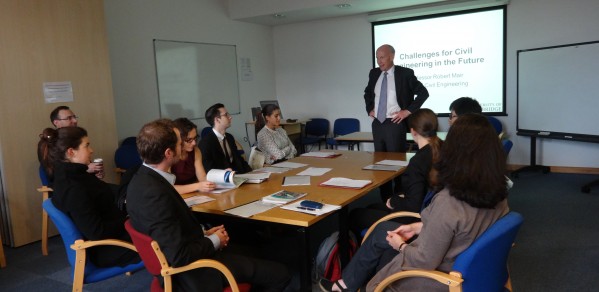
The EPSRC Centre for Doctoral Training in Future Infrastructure and Built Environment at the University of Cambridge is accepting applications for the last remaining places for entry to its graduate programme in October 2015.
I feel that I made the right decision to enrol in the Centre for Doctoral Training in Future Infrastructure and Built Environment course as it builds upon my professional experience, furthering my ability to approach challenges in a creative way.
Hannah Baker, current MRes student.
After a very popular first round of applications, the second round is now open and applications are invited for the remaining places on the programme. Funding for fees and maintenance is available for successful applicants who satisfy EPSRC eligibility requirements.
The Centre is based at the Department of Engineering at the University of Cambridge and funded by the Engineering and Physical Sciences Research Council (EPSRC). Its aim is to provide a world-leading education, developing the engineering leaders of tomorrow who have strong commercial and technical skills.
The academic programme is co-created with industry partners and comprises a 1-year MRes (masters) course followed by a 3-year PhD. The MRes course is based on a small, select cohort of students with the MRes adapted to each cohort and combining taught modules, project work, and a substantial MRes dissertation. Entry can either be direct to the MRes, or via the I+ scheme. The I+ scheme is a 5 year programme based on a 1+1+3 model where during the first (I+) year the student is an industry employee working for an I+ partner. At the end of the I+ year, the student joins the University of Cambridge as a graduate student and continues through the MRes and PhD.
"I feel that I made the right decision to enrol in the Centre for Doctoral Training in Future Infrastructure and Built Environment course as it builds upon my professional experience, furthering my ability to approach challenges in a creative way.” says Hannah Baker, a current MRes student.
Examples of activity on the MRes course in the coming weeks include completion of a group project on “smart roads” with an industry partner and in conjunction with the Judge Business School, a study tour in London, individual research projects, and training on new state-of-the-art equipment and research techniques.
As Dr Andrew Lennon, Course Director, explains "The integrated graduate programme is designed to prepare students for advanced research. It builds on Cambridge's considerable strengths and research expertise across many aspects of Civil Engineering".

